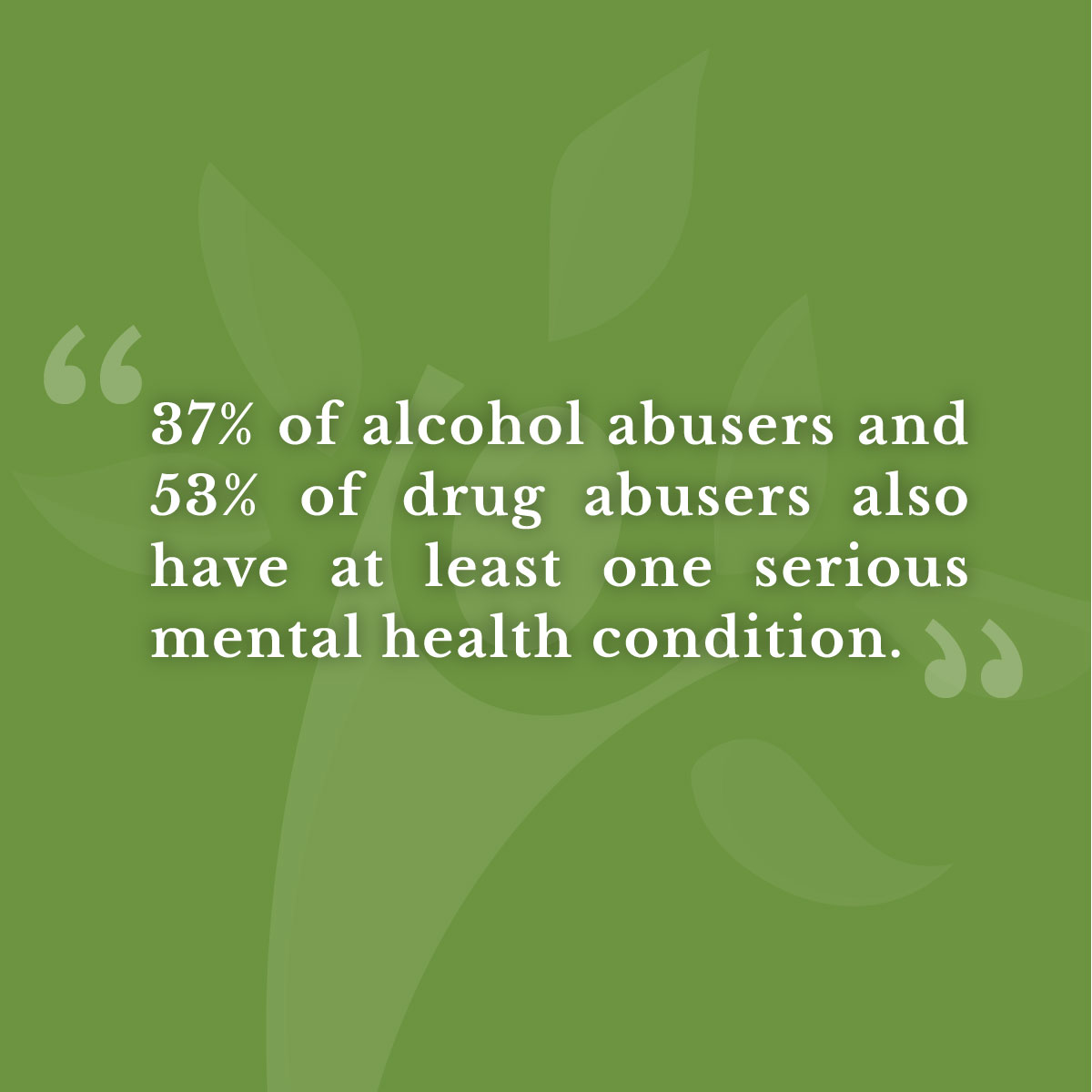
When someone has an addiction and a mental health illness, it is called a dual diagnosis. According to the Substance Abuse and Mental Health Services Administration (SAMHSA), about one-third of people dealing with a substance abuse problem also suffer from some form of mental illness.
Mental illness and addiction are common, treatable conditions that many people are able to overcome. Some of the most common mental health conditions are depression and anxiety, but the term covers everything from panic attacks to schizophrenia.
Many addictions involve alcohol, prescription drugs and street drugs, but can include pathological gambling, sex addiction and eating disorders.
Types of Co-occurring Disorders
Dual diagnosis, or co-occurring disorders, can comprise any type of addiction plus any type of mental health disorder. Here are some examples of conditions that qualify as comorbidities:
- Heroin use and depression
- Meth use and anxiety
- Abuse of prescription drugs and borderline personality disorder
- Crack cocaine and schizophrenia
- Ecstasy and sex addiction
- Alcohol and pathological gambling
- Cocaine use and bulimia
There is an undeniable connection between addiction and mental health. For decades, treatment addressed only one diagnosis at a time. People were required to get clean and sober and then start a new treatment program that addressed mental health conditions. Now, we realize that the best way to treat co-occurring disorders is to deal with them concurrently.
The interconnected nature of mental health and addiction necessitate a simultaneous recovery process. Any other plan just doesn’t work.
Dual Diagnosis Facts
Dual diagnosis cases are much more common than many people realize. Here are some notable stats from SAMHSA on the interwoven nature of mental disorders and substance use disorder:
- More than 43 million adults in America experience some type of mental illness.
- More than 20 million adults experience substance use disorder.
- About 8 million people have disorders from both groups.
- 50 percent of dual diagnosis patients do not receive treatment for either disorder.
Lack of treatment for symptoms can drive people to self-medicate with drugs and alcohol, and when someone falls prey to substance abuse, symptoms of one disorder tend to accentuate symptoms of the other. Mental disorders frequently co-occur with each other, as well as with substance use disorders.
The Impact of Trauma on Mental Health and Addiction
Trauma has a significant impact on our moods and our brains. Even years after a traumatic experience, people can suffer emotionally and psychologically. This type of suffering causes difficulties with mental stability and a desire to self-medicate to feel better.
When trauma is left untreated, a person often represses his or her painful memories to survive. Past trauma affects one’s:
- Worldview
- Views on other people
- How people behave in stressful situations
- Self-esteem level
Because trauma intertwines mental disorders with addictions, it makes sense to use an integrated approach to therapy.
Co-occurring Disorders Treatment
 Finding a dual diagnosis treatment program that includes therapy for both conditions is important. Many rehabilitation facilities are not capable of handling dual diagnosis patients. Therapy for simultaneous treatment of both diagnoses is still a relatively new concept.
Finding a dual diagnosis treatment program that includes therapy for both conditions is important. Many rehabilitation facilities are not capable of handling dual diagnosis patients. Therapy for simultaneous treatment of both diagnoses is still a relatively new concept.
Substance abuse is often rooted in psychiatric or emotional difficulties. Therefore, treating only the symptoms of drug abuse while leaving mental health conditions unresolved leaves patients struggling with the same issues that caused them to take substances.
Conversely, substance abuse is known to cause depression, anxiety and other mental health problems. The longer someone indulges in drugs, alcohol or other addictive habits, the more potential damage is done to the brain.
Integrated, simultaneous therapy proves to be the best, most effective rehabilitation treatment available today. Dual diagnosis patients are known to be a higher risk for violence, relapse, overdose and suicide.
Dual diagnosis patients require:
- Extra care
- Individualized treatment plans
- Longer rehab and aftercare
Since they are more difficult to treat, patients with a dual diagnosis need specialized attention and individualized care to achieve success in recovery.
Coping with Emotional Pain
Emotional pain is one of the biggest reasons people abuse drugs or alcohol and fall into addiction. Managing feelings is one of the most difficult tasks for people who have not learned coping skills. Turning to substances seems easier to dull the pain, and for a time, it does feel good. But soon, life becomes unmanageable and the consequences of drug use rob people of their lives.
In rehab centers that address comorbidity, patients learn how to effectively deal with their feelings and do the hard work that emotional sobriety requires. Once a person has the tools to process their feelings and work through them with healthy coping skills, they can let go of addiction(s) and begin their recovery.
Dual Diagnosis Help for Families
Family members want to help their loved ones get well, but often don’t know where to start. The average family isn’t well versed in psychiatric conditions, but there are signs and symptoms you can look for in order to help your loved one.
Signs and symptoms of addiction and mental health problems:
- Isolating behavior
- Decline in attendance and grades at school or work
- Lying and stealing (missing valuables around the house)
- Hearing, seeing or believing in things that are not real
- Dramatic shifts in mood and energy
- Insomnia or sleeping all the time
- Disinterest in personal hygiene
- Reckless and risky behavior
- Family history of addiction or mental illness
Dual Diagnosis Rehab
With so many people affected by co-occurring disorders, rehab centers are realizing the need to incorporate mental health therapy into their programs for addiction. Both disorders require equal attention.
The choice of a rehab center is an important decision that you should not make lightly. It can have a long-lasting impact on your life, for good or bad. To complicate matters, people suffering from addiction and mental health issues often struggle to make good decisions. They need a loving family member to guide them in finding the right help.
Maryland Recovery offers top-notch treatment for both addiction and mental health. We are one of the most comprehensive long-term dual diagnosis facilities on the East Coast. Mental health conditions and addictions can require a lifetime of recovery. The longer your treatment, the more favorable the statistics are for a successful recovery and minimized chance of relapse. Maryland Recovery offers the necessary long-term care, providing families with a solid foundation.
Read About Our Dual Diagnosis Program
Reviewed by Christopher Schwartfigure MS, LGPC, CAC-AD








